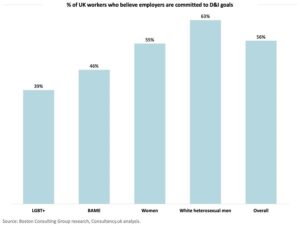 While the UK workplace of today might be markedly different from that of just 20 years ago, efforts to promote diversity by employers seem to have stalled in recent times. According to a new study, almost half of workers in Britain feel their company has not made progress on the matter, with that figure rising among the BAME and LGBT+ communities.
While the UK workplace of today might be markedly different from that of just 20 years ago, efforts to promote diversity by employers seem to have stalled in recent times. According to a new study, almost half of workers in Britain feel their company has not made progress on the matter, with that figure rising among the BAME and LGBT+ communities.
A plethora of thought-leadership pieces, analytic exercises and industrial studies have consistently told business leaders that improving Diversity & Inclusion (D&I) in the workplace can improve business results, as well as benefitting the world beyond the office. By addressing issues including pay gaps and social attitudes in the recruitment process, the LGBT+ and BAME communities and women could better contribute to companies, and be better accommodated by society. Despite the mounting body of evidence, however, with a potential boost to financial performance of 30% up for grabs, corporations continue to drag their feet on the matter.
The latest research from Boston Consulting Group (BCG) makes for damning reading in this regard, with the stunning conclusion that almost half of UK workplaces have failed to advance on the matter of inclusivity. According to a survey of some 2,000 workers based in Britain, nearly half said that their employer had not made any progress on D&I in the past three years. Compared to other survey respondents, LGBT+ workers were the most sceptical of their employers’ efforts to promote a D&I agenda, despite a BCG study finding that the UK is one of the world’s most inclusive business environments for LGBT+ staff.
The idea of ‘pink washing’ – where a corporation with little interest in advancing LGBT+ rights use such activities to launder its reputation and make money – has become prominent in public discourse. 36% of people now believing Pride has become too commercial, and companies like Costa Coffee have faced criticism for using fundraising at the parade to support its internal LGBT+ network, rather than putting company funds toward the matter. In this atmosphere, it is not especially surprising that only 39% of LGBT+ respondents told BCG that they considered their organisation’s management to be committed to D&I goals.

While a slightly higher number of Black, Asian & Minority Ethnic (BAME) respondents stated they believed their company was committed to D&I initiatives, the figure still fell at less than half. In what can at best be called an underwhelming number, only 46% of BAME respondents subsequently said they thought progress had been made in the last three years. Across the EU, a recent study from Grant Thornton found that only 19% of businesses felt ethnic representation in their firm was an issue, while of those only 6% were taking action on the matter.
Respondents identifying as women were more likely than these groups to suggest there had been progress, although obviously interpretation of this data should make allowance for the fact respondents could identify as more than one of these categories. 55% of women told BCG that they felt the last three years had seen their company progress in terms of D&I. This supports another study from Grant Thornton, which found that the proportion of businesses with at least one woman in senior management has grown to75% in the last year, representing gradual progress on the matter among the world’s largest firms.
While 74% of all respondents said they were aware that their organisation had launched diversity programmes, only 33% of the intended beneficiaries said they had gained anything from them. At the same time, there was a notable disconnect between these groups and those traditionally less-marginalised in society and the workplace. Respondents identifying as white heterosexual men exhibited the highest belief that their workplace was doing enough to promote D&I interests, at 63%. This figure in particular might well hold the key to why companies are still failing to live up to the hype surrounding their D&I goals.
Time for action
Barely 3% of Britain’s most powerful and influential people are from black and minority ethnic groups (while making up 13% of the population), according to a 2017 analysis from the Guardian that highlights continuing inequality despite decades of legislation to address discrimination. Meanwhile, in the same year only seven of the CEOs leading FTSE 100 companies were women, increasing by from four in 2014. With so little movement on D&I, and with those most likely to control companies hailing from the group most satisfied with progress on the matter, it is small wonder that more rapid change has been stifled.
Such is the extent that D&I efforts have stagnated, that a growing number of voices are calling for regulatory intervention to improve the situation. According to an EY study of Irish business leaders in 2018, this has even taken route in the corporate sphere, where leaders were roughly split on the notion of using the law as a tool to encourage diversity. Only a minority of 35% are completely opposed to the idea, an interesting finding given the business world’s traditional opposition to state intervention.
The study’s release provoked a response both from industry and society at large. It appeared in a range of publications, including noted LGBT+ news provider Pink News, as well as business news publication Forbes.
From the business world meanwhile, Sarah Kaiser, Employee Experience, Diversity & Inclusion Lead at Fujitsu EMEIA, commented, “What this report makes clear is that anyone connected to an organisation in any capacity wants to hear how their employer feels about D&I and what they’re doing about it. The time has passed for apologising, organisations need to urgently take action and ensure they are facilitating an entirely diverse and inclusive workforce. It is only by engaging a diverse array of people in business that we can hope to protect the future competitiveness of the UK economy.”
BCG’s survey of 2,000 British workers was conducted as part of a larger study researching the most effective diversity and inclusion policies, involving a total 16,500 respondents worldwide. The figures gathered from the UK suggest that British workers are marginally more likely to feel the benefit of corporate diversity drives – although considering just 25% of female and minority employees said they benefit from such programmes, that is not an especially marked achievement.
Matt Krentz, a Senior Partner at BCG and a co-author of the global report, said, “Our data also identified a back-to-basics approach when it comes to improving diversity programs, identifying three fundamental prerequisites for organizations to create change. These measures include focusing on anti-discrimination policies, engaging in bias awareness training, and removing bias from evaluation and promotion decisions.”
Source – www . Consultancy . Uk
